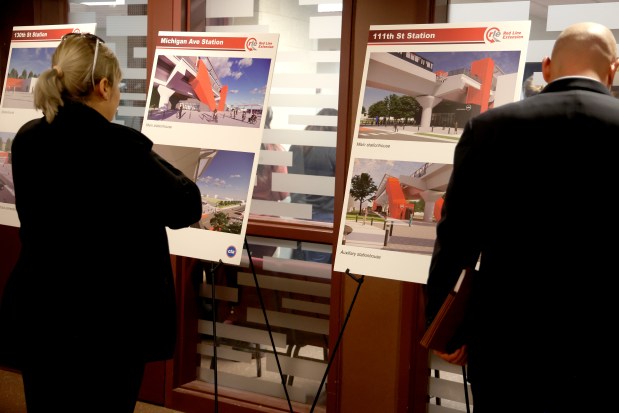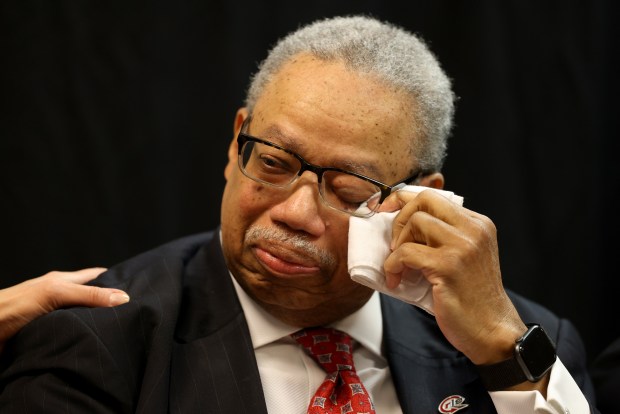Mayor Brandon Johnson gave a pointed endorsement Friday of embattled CTA president Dorval Carter ahead of a potential showdown with state leaders over the future of the transit agency, at a news conference heralding the official approval of the last chunk of federal money for the Red Line extension.
The Tribune reported this week that the CTA was set to formally lock in the money before President-elect Donald Trump takes office, paving the way for the advent of the long-planned rail addition to Chicago’s Far South Side. The signing of the agreement before the Trump White House and a Republican-controlled Congress assume office on Jan. 20 safeguards the future of the project, officials said at a news conference at a West Pullman church.
The announcement also doubled as an endorsement of Carter’s job performance, with the mayor sending a blunt message to members of the Illinois General Assembly who are mulling tying a bailout of the CTA’s finances to changes in leadership and other ways to hold the heads of regional transit agencies accountable.
“Any attempt to hold hostage the people of Chicago for anyone’s political gain, we’re certainly not going to acquiesce to those levels of constraints,” Johnson said when asked about those demands. “Here’s what we’re committed to, is making sure that the Chicago Transit Authority is fully funded so that we can have affordable, reliable and safe transportation.”
A fiscal cliff for the transit agency once pandemic aid dries up in 2026 and a pending bill to wrest CTA control from Johnson and consolidate it with the region’s other three transit agencies looms in the upcoming spring session. Gov. JB Pritzker last year also suggested a shakeup in CTA leadership was necessary.
On Friday, the mayor recalled a conversation a few months ago in which Carter recounted to him that Chicago’s first Black mayor, Harold Washington, also faced efforts to “undermine” his authority over the local transit and public school systems. Carter followed up by saying: “This isn’t about leadership. This isn’t about accountability. … This is really about funding.”
Johnson has dodged questions about Carter’s future in the wake of protracted CTA service complaints by repeating as recently as this week that he does not discuss “personnel issues.”
But the mayor’s Friday appearance with Carter demonstrated their steadfast alliance, including when Johnson teased the CTA president — who had thanked an audience member shouting “to God be the glory” — with: “I didn’t know that he was the (CTA) president and the voice of God. You should have asked for a raise a long time ago.”
Carter, for his part, took multiple chances to flex his leadership bona fides.
“I want to take a moment to take out a handkerchief here, because I tend to get a little emotional … when I’m talking about this project,” the CTA president, appointed under Mayor Rahm Emanuel, said in his remarks. “We — and specifically me — have assured the people of Roseland, Rosemoor, Pullman and other Far South Side neighborhoods that we were making real progress towards making this project become a reality.”
Friday’s announcement concerned the formal signing of a nearly $2 billion federal grant that is key to moving the $5.3 billion project to extend the Red Line from 95th to 130th Street. Congress must still regularly approve the money, but officials have said the agreement is considered a done deal at this point.
The federal money will go toward extending the Red Line south by 5.6 miles to 130th Street and adding four stations. A subject of discussion for more than 50 years, the CTA touts the extension as a major investment in the city’s Far South Side, even as costs of the project have ballooned by more than $1 billion in recent years as expenses for materials, labor and financing rose.
With the federal funding secured, construction on the extension could start in late 2025, with service on the new tracks slated to begin in 2030.
Meanwhile, the fallout from this week’s flareup between Johnson and the governor over a failed hemp bill could have implications for the future of Chicago’s public transit system, too. At a Thursday evening event, the mayor scoffed at Pritzker dinging his administration Monday for poor relationships with Springfield.
During a panel at the University of Chicago’s Institute of Politics, the mayor pointed to what he said were strong ties to Illinois Senate President Don Harmon, in whose office Johnson got his start in politics as a staffer, and House Speaker Emanuel “Chris” Welch, along with state Reps. Lakesia Collins and Will Guzzardi.
It was an opportune moment to indirectly capitalize on the governor also making a rare dig at Welch and House Democrats this week for siding with Johnson to kill the hemp regulation bill.
“This notion that somehow I don’t have relationships in Springfield, well, they should actually go look at the true record,” Johnson said. “I did not show up as mayor of Chicago, then had to build relationships. I built relationships to make it possible for me to become mayor of Chicago.”

Johnson also told the room, “I don’t believe that’s the best pathway forward,” when asked about the Springfield bill to consolidate Chicago-area transit systems and wrest control from him. And he implored students to help him pressure the state for a host of longshot revenue ideas, such as a real estate transfer tax hike, a millionaire’s tax and a graduated income tax.
“All the naysayers out here who want to pop off about how popular I am and how popular I’m not, I do not care,” the mayor said. “The only thing I care about is serving people, showing up for the people who’ve been marginalized in this city for generations. Help me fight the fight.”
Meanwhile, with President Joe Biden’s term drawing to a close, his administration also awarded millions of dollars more in federal grants for other transportation-related projects in the Chicago area and other parts of Illinois.
The state secured $114 million in federal funds for new electric vehicle charging stations across the state, including in the Chicago area, Springfield and the Metro East area of Illinois near St. Louis, Gov. JB Pritzker’s office announced Friday.
His office also said the state will receive $43 million in federal money for a rail project that includes the creation of an overpass to improve travel for motorists, bicyclists and pedestrians on Chicago’s Southwest Side and its neighboring suburbs of Bedford Park and Summit.
Tribune reporter Jeremy Gorner contributed reporting.





